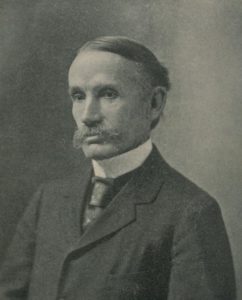

A prestigious award that the American Economic Association awards every year is the John Bates Clark Medal. But who was John Bates Clark and what is he known for? I answered those two questions in my bio of Clark that was recently added to the online Concise Encyclopedia of Economics.
As I say in the bio:
John Bates Clark was one of the leading American economists of the late 19th and early 20thcenturies. He made contributions in the areas of utility theory, marginal productivity theory, capital theory, and competition and antitrust. In his later years, he focused on how to end war.
Much of Clark’s early work was collected in The Philosophy of Wealth (1886). In that collection is Clark’s statement of the idea of marginal utility, which he called “effective utility.” He was not the first economist to adopt the concept of “marginal utility.” That distinction goes to the three founders of marginal utility theory, William Stanley Jevons of England, Carl Menger of Austria, and Leon Walras of Switzerland. But, according to George J. Stigler, Clark independently discovered it.
Here’s one of my favorite quotes from his work:
Give to a man one unit of the article A, and then another and another, till he has ten of them. While each of the articles in the series may do him some good, the amount of the benefit will Steadily diminish, as the number of the articles grows larger, and the tenth one will benefit him least of all. In order to add to his stock of A, the man will never sacrifice more than what is, in his view, a fair offset for the benefit that he will get from the tenth and last unit of it. In order that an article may be wealth at all, each unit of the supply of it must, as we have seen, be of some importance to its owner. The law that we have just cited marks the last unit of the supply as the least important unit. This is one of the universal laws of economics. (Distribution of Wealth, p. 42.)
Read the whole thing.
Thanks to Tyler Cowen for some helpful suggestions.

READER COMMENTS
Mike Sproul
Dec 24 2022 at 3:07pm
It sounds like Clark did not know the difference between marginal utility (which is not measurable) and marginal rate of substitution (which is measurable).
Roger McKinney
Dec 25 2022 at 9:13am
The theologians at the University of Salamanca, Spain, explained marginal utility in their works on prices in the mid 16th century according to Schumpeter and others.
Mark Brady
Dec 25 2022 at 6:53pm
And it wasn’t only the School of Salamanca. “The subjective approach to the theory of value had important roots in England as in Italy, in France as in Germany, in the eighteenth and nineteenth centuries.” (Alessandro Roncaglia, A Brief History of Economic Thought [2017], pp. 146-48.) Examples include Ferdinando Galiani (1728-1787), Hermann Heinrich Gossen (1810-1858). Johann Heinrich von Thűnen (1783-1850), and the Oxford-Dublin school, especially William Forster Lloyd (1794-1852).
Jon Murphy
Dec 25 2022 at 10:42am
From the linked bio:
I like this quote from Clark a lot and I think I will start using it in my classes. I make the same point to my students to try and debase them from “categorical” thinking (by that I mean, the fallacy of trying to jam people into immovible boxes). In some roles, we are capitalists. In others, laborers. In still others, we are both.
I think this composite nature of economic life is part of the reason there are so many unintended consequences to legislation. Legislation designed to try and help one group suffers from the knowledge problem, yes, but also from the fact that people are not sorted into nice little boxes. Take, for example, California’s bill aimed at gig workers. The bill treats gig workers as laborers, specifically as laborers of the companies like Uber, Lyft, etc. To some extent they are laborers (contractors), but they are also capitalists. They own the capital (their cars) and these platforms allow them to employ their capital in a profitable manner. These gig workers are composits. Thus, a bill aimed at helping labor (at the expense of capitalists) accidently hurts the very group it is trying to help.
The same holds true for supply and demand. Whether one person is a demander in a market or a supplier will depend on the price of the market. I like to use a variation of the example Walter E. Williams used: most students are demanders of clothing. But there is some price I can offer that will turn them from demanders into suppliers and induce them to sell me the shoes off their feet.
We are composits and our roles depend on the situation we find ourselves in. I think that major insight is what Marx and the Marxists never understood.
Mark Brady
Dec 25 2022 at 8:06pm
“Much of Clark’s early work was collected in The Philosophy of Wealth (1886). In that collection is Clark’s statement of the idea of marginal utility, which he called “effective utility.” He was not the first economist to adopt the concept of “marginal utility.” That distinction goes to the three founders of marginal utility theory, William Stanley Jevons of England, Carl Menger of Austria, and Leon Walras of Switzerland. But, according to George J. Stigler, Clark independently discovered it.”
But as Paul A. Samuelson, who won the first John Bates Clark Medal in 1947, observed in 1967, “To learn for yourself a new theory ten years or more after it has been widely published is to invite from the jury an indictment of negligence rather than an award for brilliance.”
Comments are closed.